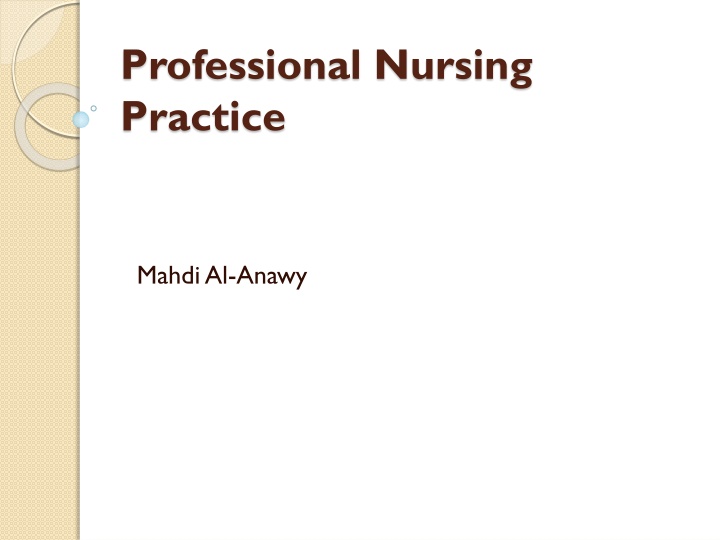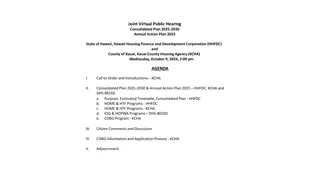
Evolution of Professional Nursing Practice and its Key Features
Explore the historical background and evolution of professional nursing practice from Florence Nightingale to the modern era. Discover the specialized knowledge, ethical principles, and commitment to lifelong learning that define nursing as a respected profession. Delve into the role of nurses in advocating for patient care, promoting health, and upholding professional standards.
Download Presentation

Please find below an Image/Link to download the presentation.
The content on the website is provided AS IS for your information and personal use only. It may not be sold, licensed, or shared on other websites without obtaining consent from the author. If you encounter any issues during the download, it is possible that the publisher has removed the file from their server.
You are allowed to download the files provided on this website for personal or commercial use, subject to the condition that they are used lawfully. All files are the property of their respective owners.
The content on the website is provided AS IS for your information and personal use only. It may not be sold, licensed, or shared on other websites without obtaining consent from the author.
E N D
Presentation Transcript
Professional Nursing Practice Mahdi Al-Anawy
Nursing Nursing is the protection, promotion, and optimization abilities,prevention of illness and injury, facilitation of healing, alleviation of suffering through treatment of human advocacy in the families, groups, populations of health and the diagnosis response, of communities, and and care individuals, and
1. Nursing as a Profession Nursing is an esteemed profession that plays a vital role in healthcare by promoting health, preventing illness, and providing compassionate care to individuals, families, and communities. It is grounded in scientific knowledge, technical skills, and making it a cornerstone healthcare systems. ethical principles, modern of
Historical background Nursing practice has evolved over the centuries, beginning Nightingale in conducting her own research on caring for soldiers in the Crimean War, to contemporary nursing practice in the 21st century where healthcare delivery has become complex, requiring educated nursing workforce to meet the needs of a diverse,aging population. with Florence century the 19th a highly
Features of Nursing as a Profession Specialized Knowledge Nursing is built on a foundation of evidence-based practice and research, ensuring that care provided is scientifically sound and effective. Formal Education andTraining Nurses complete rigorous including diplomas, associate degrees, and advanced graduate degrees, alongside clinical training to develop their expertise. Ethical Practice Guided by a professional code of ethics, nursing emphasizes respect for autonomy,and justice in care delivery. academic degrees, bachelor's programs, human dignity, patient
Professional Autonomy Nurses make independent decisions within their scope of practice, including clinical judgment, patient advocacy, and care coordination. Commitment to Lifelong Learning Continuous professional development ensures nurses remain updated with evolving healthcare practices and technologies. Service Orientation Nursing is inherently altruistic, prioritizing the health and well- being of patients and communities above personal gain. Professional Standards and Organizations Bodies like the American Nurses Association (ANA) and the International Council of Nurses (ICN) establish guidelines, advocate for the profession, and promote excellence in nursing.
2. Dimensions of Nursing Practice Nursing practice is multifaceted,focusing on holistic care that addresses the physical, emotional, social, and spiritual needs of patients. a.Clinical Dimension Involves direct patient care, including assessment, diagnosis,intervention,and evaluation. Management of acute and chronic conditions. b.Ethical and Legal Dimension Ensures adherence to beneficence,nonmaleficence,autonomy,and justice. Compliance with legal standards, including informed consent,patient rights,and confidentiality. ethical principles like
c. Communication Dimension Effective interaction with patients, families, and interdisciplinary teams to promote understanding and collaboration. Accurate documentation and patient education. d. Cultural and Diversity Dimension Provides culturally competent care, respecting patients' beliefs, values, and practices. e. Leadership and Management Dimension Coordination of care delivery, delegation of tasks, and supervision of healthcare teams. Advocacy for patients and participation in healthcare policy development.
f. Research and Evidence-Based Practice Integration of current research findings into clinical practice to improve patient outcomes and advance nursing standards. g. Health Promotion and Education Educating individuals and communities on disease prevention, health maintenance, and lifestyle modifications
3. Characteristics of a Profession in Nursing Nursing is distinguished as a profession through the following characteristics: 1-Specialized Body of Knowledge Nursing practice relies on an extensive and evolving body of scientific knowledge and clinical expertise. 2-Autonomy andAccountability Nurses exercise professional judgment within their scope of practice and are accountable for their actions and decisions. 3-Commitment to Service The profession prioritizes public welfare, addressing individual and community health needs.
4-Ethical Practice Guided by ethical principles, nurses ensure equitable and respectful care delivery. 5-Professional Standards Nursing standards organizations like the ANA and ICN ensure consistent,high-quality care. 6-Licensing and Regulation Licensure validates competence and ensures adherence to professional and legal standards. established by
Lifelong Learning and Development Commitment to ongoing education fosters professional growth healthcare advancements. Collaboration andAdvocacy Nurses work collaboratively healthcare professionals and advocate for patients rights and well-being and adaptation to with other
Advanced role of the nurse 1. Advanced (APRNs) APRNs are nurses who have completed advanced education (typically a master s or doctorate) and clinical training. They are authorized to perform roles traditionally associated with physicians, such as diagnosing and managing health conditions. APRNs include: Nurse Practitioners (NPs): Provide primary and specialty care, diagnose illnesses, prescribe medications,and develop treatment plans. Practice Registered Nurses
Clinical Nurse Specialists (CNSs): Focus on improving healthcare delivery systems, providing expert consultation, and advancing nursing practices within specific specialties (e.g., oncology, pediatrics). Certified Registered Nurse Anesthetists (CRNAs):Administer anesthesia, manage pain, and ensure patient safety during surgical procedures. Certified Nurse Midwives (CNMs): Provide comprehensive care to women, including prenatal care, childbirth, and postpartum support.
2.Nurse Educators Nurses in this role focus on preparing and mentoring the next generation of nurses. They teach in academic settings,develop educational materials, and ensure that nursing education aligns with current healthcare trends. 3.Nurse Researchers Nurse researchers conduct studies to improve patient care, develop innovative treatments, and enhance healthcare systems. Their work contributes to evidence-based practices and the advancement of nursing science.
4.NurseAdministrators and Leaders Nurses in administrative and leadership roles oversee healthcare organizations, manage nursing staff, develop policies, and ensure the efficient delivery of quality care. They advocate for systemic changes to enhance patient outcomes and staff well-being. 5.Public Health Nurses These nurses address community health issues, focusing on disease prevention, health promotion, and education. They collaborate with government agencies and organizations to improve population health outcomes.
Remember ! Nursing as a Profession Features of Nursing as a Profession Dimensions of Nursing Practice Characteristics of a Profession in Nursing Advanced role of the nurse


















